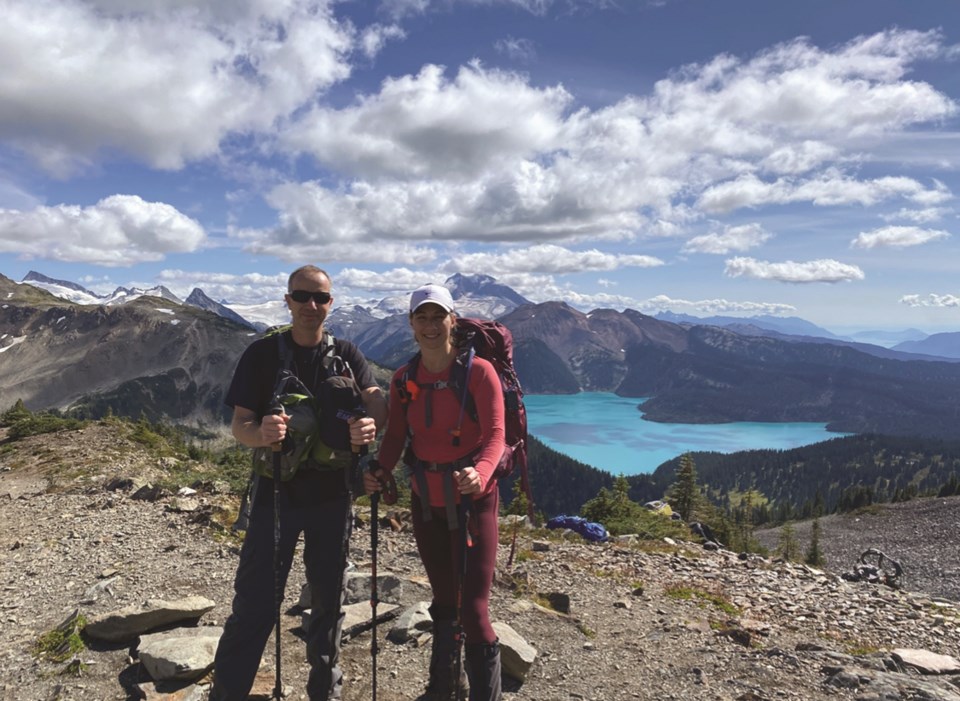Hiking through the steep, rocky peaks of the Coast Mountains can be a gruelling endeavour, even for the approximately 80 per cent of Canadians who don’t live with chronic pain.
Toss unrelenting discomfort into the mix, and even making it to the trailhead becomes its own uphill battle.
It’s something Tom Hoppe found out first-hand last year when he set out to climb Garibaldi Provincial Park’s iconic spire Black Tusk alongside physician Dr. Lindsay Rite, director of integrated health at CHANGEpain, a multidisciplinary, complex pain centre in Vancouver.
Hoppe, a military veteran who resides on the Sunshine Coast, first started working with Rite to learn about not only how to manage his own pain, but how veterans’ and military members’ mindsets impact their healing journeys—“the way we’re trained in military, how we push through pain,” Hoppe explained. Getting back into nature and hiking—and to Black Tusk’s summit, more specifically—was one of the goals he set.
“To watch the true elation that he had when he achieved that goal was really quite meaningful,” remembered Rite.
Now, Hoppe and Rite are preparing to share that same experience with a group of 13—eight of whom are also veterans—on Saturday, Aug. 27, with participants heading to Whistler from across the country for the event. Blackcomb Helicopters will fly the hikers to the company’s tenure near Pemberton, where the group will complete an approximately seven-kilometre hike through the alpine terrain.
The event aims to help participants set goals while managing their chronic pain.
Though military veterans suffer from chronic pain at twice the rate of the civilian population, said Hoppe, strategies to deal with chronic pain and promote safe movement aren’t exactly topics that are addressed during basic training.
“My intent was to develop a hike that’s not just about a hike,” said the organizer. In the months leading up to the hike, participants have been meeting virtually with professionals like Rite every second week to learn about topics like chronic pain, safe movement and nutrition, for example. The goal is for the veterans to not just reach the peak, but to finish the hike armed with education that will improve their quality of life, Hoppe explained.
Plus, “when we joined the military, we were looking for adventure, achievement and comradeship,” Hoppe added. “That’s part of what this hike is doing, plus the knowledge at the end.”
Veterans also have to contend with the psychosocial effects of “the identity change” that accompanies leaving the military, said Hoppe.
“In the military, it’s mission first, self last. So if you always put yourself last and you push through pain, that is a challenge,” he said.
The hike program is also an opportunity to get veterans involved in research being carried out by both the Chronic Pain Centre of Excellence (CPCoE) and clinics like CHANGEpain, Hoppe said.
Hoppe is currently chair of CPCoE’s advisory council for veterans. He served a 20-year stint in the Canadian Armed Forces beginning in 1982—including a tour of Bosnia, during which he rescued three children who were being shot at by a sniper, earning him both the Governor General’s Meritorious Service Cross and Medal of Bravery for his courage under fire—before following up his military service with a career in public safety and security. After leaving the military, Hoppe completed a Business Administration and Human Resources program, as well as a Master of Arts in Leadership and Training, and remains heavily involved with veteran advocacy. CHANGEpain, meanwhile, works with the CPCoE as one of the centres of excellence for Canadian vets.
Hoppe and the CPCoE also launched a podcast earlier this year, called “The Most Painful Podcast,” bringing in experts to talk about pain and other related topics.
“This hike and that podcast are all part of getting veterans educated, but it doesn’t just help veterans,” said Hoppe. “This information will help anybody [struggling with chronic pain] out there.”
The hike is, ideally, the first of many in the years to come.
“To be able to not only help the veterans by educating them and finding services that help, but really to walk this journey with them and bring them to a point where they can really see that so much is achievable … is a very powerful thing,” said Rite. “I think the hike is quite unique in that way. There aren’t a lot of programs out there that are such a tangible goal in a way, that I think is transformative; life changing.”




